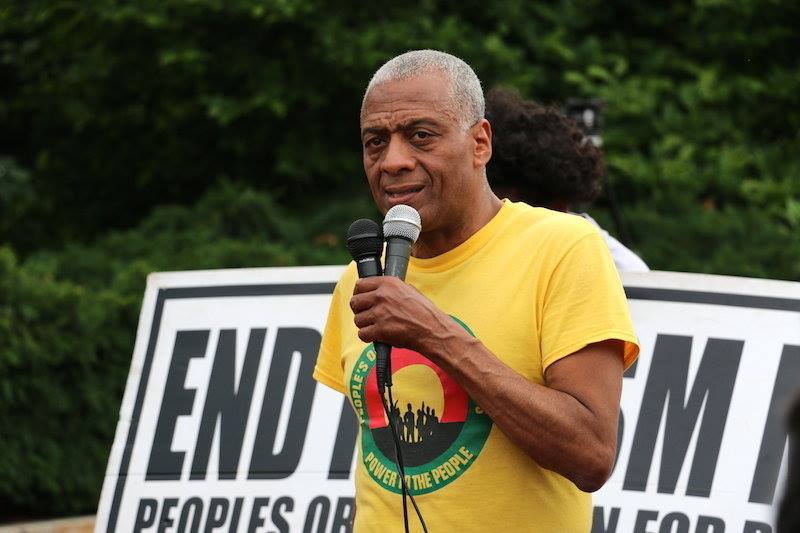Two major New Jersey-based activist organizations—The People’s Organization For Progress (POP) and The Martin Luther King People’s Convention for Justice and Resistance (MLKPCJR)—issued a joint statement this week sharply criticizing President Donald Trump’s recent decision to deploy National Guard troops and assume greater federal control over Washington, D.C.’s police force.
The announcement, made by Trump yesterday, has sparked outrage among civil rights advocates nationwide, who view the move as unnecessary, politically motivated, and a dangerous precedent for federal overreach into local governance.
“An Unnecessary and Dangerous Move”
Lawrence Hamm, chairman of POP, spoke on behalf of both organizations, calling the deployment “absolutely unnecessary” and accusing the president of using misleading claims about rising crime to justify his actions.
“He said he was doing this because of a spike in crime, when statistics show the opposite is true,” Hamm stated. “This has nothing to do with public safety and everything to do with the president’s desire for greater power and control. Obviously, being a political dictator is not enough—he wants to be a military dictator, too.”
POP, a volunteer grassroots group, has been advocating for racial, social, and economic justice in New Jersey for decades. MLKPCJR, meanwhile, is a broad coalition of 287 organizations formed to advance social justice causes, many of which center on civil rights, voting rights, and community empowerment.
The Broader Political Context
Critics see the D.C. troop deployment as more than just a law-and-order maneuver. Hamm argued that Trump has consistently shown willingness to use the National Guard for political theater—highlighting his controversial decisions to send troops to Los Angeles without clear justification, while delaying mobilization during the January 6th Capitol insurrection.
“When the Capitol was under violent attack by rioters trying to overthrow the government, he waited hours to mobilize the Guard,” Hamm said. “People were injured and killed because of that delay. But now, he’s quick to send them into cities where they aren’t needed.”
Hamm further suggested that the D.C. takeover could be a calculated distraction from Trump’s mounting political troubles, including unpopular domestic and foreign policies, deep cuts to social programs, tax breaks for the wealthy, sinking poll numbers, and controversies such as the Epstein files.
Racial and Political Dimensions
Hamm and other activists also see the move as part of a racially charged political strategy. He noted that many of the cities targeted for troop deployments have large Black populations and Black mayors, framing the D.C. action as “an attack on Black self-determination and Black political power.”
“Home rule for Washington, D.C. was something African Americans fought very hard for,” Hamm said. “It’s seen as a step toward statehood, which Black residents and other D.C. citizens have demanded for decades. Republicans have introduced legislation to end home rule, and it’s even targeted for elimination in Project 2025.”
Hamm asserted that Trump’s actions align with what he called a “white supremacist apartheid agenda”, arguing that sending troops into majority-Black cities is intended to intimidate and suppress political power in those communities.
Calls for Resistance and Action
Despite the heightened tensions, Hamm made it clear that neither POP nor MLKPCJR intends to back down.
“Trump is trying to terrorize us into submission. We will not capitulate,” Hamm declared. “We have faced troops before during our struggle for freedom and liberation. Troops or not, we will continue to resist. We want the troops out of Washington. We want control of the police returned to the district. We want statehood for Washington, D.C. And we want an end to the Trump regime.”
The Bigger Picture for New Jersey and Beyond
While the National Guard deployment is unfolding hundreds of miles from New Jersey, the political implications resonate strongly here. Activist networks in the Garden State have historically played significant roles in national movements for racial justice, voting rights, and civil liberties. Many see the D.C. takeover as a warning signal about the balance of local versus federal authority—an issue that could impact communities across the country.
As the situation continues to develop, New Jersey activists are positioning themselves as part of a broader coalition determined to push back against what they view as federal overreach and racially motivated governance.
For continuing political coverage and updates on activism across the state, visit Explore New Jersey Politics.












